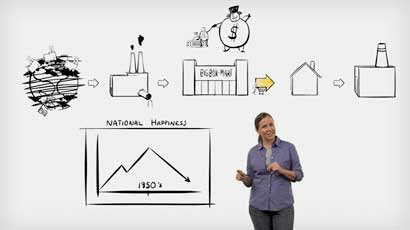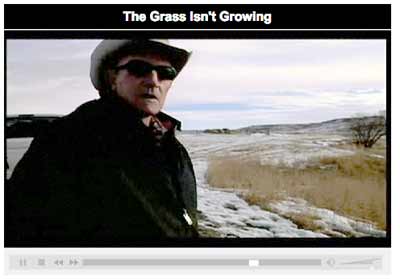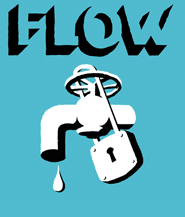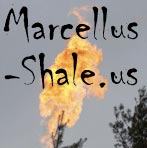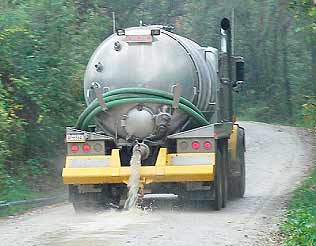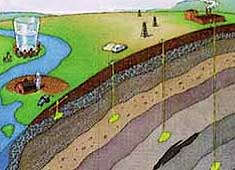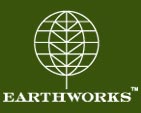Background
Gas Drilling Background and History
Joaquin Sapien and Sabrina Shankman. December 29, 2009 ProPublica.
Environmentalists, state regulators and even energy companies agree that the problem most likely to slow natural gas drilling in the Marcellus Shale in New York is safely disposing of the billions of gallons of contaminated wastewater the industry will produce...
...Of the six injection wells that operate in New York, only one is licensed to accept oil and gas wastewater. It's owned by Lenape Resources Inc., which uses it exclusively for wastewater from its own gas fields [near Rochester, NY].
See: Do the natural gas industry’s surface water withdrawals pose a health risk?
This fragile Earth deserves a voice. It needs solutions. It needs change. It needs you.
Dirceted by Daniel Bird.
Music and sound design by Hecq.
See: The Story of Stuff | With Annie Leonard
Tides Foundation is proud to present The Story of Stuff — a 20-minute, fast-paced, fact-filled look at the underside of our production and consumption patterns that calls us together to create a more sustainable and just world.
Narrated and created by activist Annie Leonard, the film tells an engaging story about 'all our stuff' where it comes from and where it goes when we throw it away.
Tides Foundation and The Funders Workgroup for Sustainable Production and Consumption partnered with Free Range Studios to produce the film and the website, www.storyofstuff.com
The website includes faith-based teaching guides.
See: Beach Lake United Methodist Church. "Gas Drilling Discussion (Suggested Agenda for) : Biblical and Theological Considerations".
Wyoming rancher Ed Swartz is feeling the affects of environmental de-regulation. Hear his story.
Ed Swartz
Gillette, WY
Added: January 18, 2009
Co-Presenting Sponsor: The Fledgling Fund supports the creation and dissemination of innovative media projects that can play critical roles in igniting social change.
The Fledgling Fund believes that film and other creative media can often demonstrate what statistics can not, can create broad understandings of social problems, and can inspire both civic dialogue and concrete action.

Irena Salina's award-winning documentary investigation into what experts label the most important political and environmental issue of the 21st Century - The World Water Crisis.
Salina builds a case against the growing privatization of the world's dwindling fresh water supply with an unflinching focus on politics, pollution, human rights, and the emergence of a domineering world water cartel.
Interviews with scientists and activists intelligently reveal the rapidly building crisis, at both the global and human scale, and the film introduces many of the governmental and corporate culprits behind the water grab, while begging the question "Can anyone really own water?"
Beyond identifying the problem, Flow also gives viewers a look at the people and institutions providing practical solutions to the water crisis and those developing new technologies, which are fast becoming blueprints for a successful global and economic turnaround.
See: Jeannette Catsoulis. Sept. 12, 2008. The New York Times. "The War Between Public Health and Private Interests".
See: Cory Doctorow . Apr 7, 2008. BoingBoing.net. "For Love of Water: infuriating and incredible documentary about world's water-crisis".
See: World-Renowned Scientist Dr. Theo Colborn on the Health Effects of Water Contamination from Fracking
See: Clean Water Action
See: WATER: Rulings Restrict Clean Water Act, Foiling E.P.A.
and Supreme Court Restricts Clean Water Act
See: WATER | That Tap Water Is Legal but May Be Unhealthy
See: WATER | FRONTLINE: Poisoned Waters
See: Drinking Water: Understanding the Science and Policy behind a Critical Resource
See: Connie Watson, CBC Radio | Feb. 4, 2003. "Sell the rain: How the privatization of water caused riots in Cochabamba, Bolivia".
See: SERC (State Environmental Resource Center). 2004. "The Meaning of Privatization."
Implications of Privatization of Water Utilities
[Provides] examples where privatized water utilities have posed risks of rate hikes, negative economic impacts, inadequate customer service, and harm to natural resources...
Independent vibrant, Canadian online magazine based in British Columbia.
Earlier this year at Two Island Lake north of Fort Nelson, two corporations, Encana and Apache, blasted an estimated 5.6 million barrels worth of water along with 111 million pounds of sand and unknown chemicals to fracture apart dense formations of shale over a 100 day period, or what Parfitt calls "the world's largest natural gas extraction effort of its kind."
...Many experts argue that shale gas could retire coal-fired plants or slow down the deployment of wind and solar projects altogether. Others contend that shale formations deplete too quickly to offer secure supplies for the future. At the same time, the "shale gale" has also created abiding controversies about water use, groundwater contamination and the regulation of the industry from Wyoming to Quebec.
Fracture Lines, commissioned by the Program on Water Issues at University of Toronto's Munk Centre, not only sheds light on the scale of development from British Columbia to New Brunswick but highlights industry's largely unregulated water use.
"In the absence of public reporting on fracking chemicals, industry water withdrawals and full mapping of the nation's aquifers, rapid shale gas development could potentially threaten important water resources if not fracture the country's water security," concludes Parfitt. (Parfitt, 2010)
Parfitt, B. Fracture Lines: Will Canada’s Water be Protected in the Rush to Develop Shale Gas? Program on Water Issues Munk School of Global Affairs at the University of Toronto, September 15, 2010.
Frac Trucks... some call them soup trucks, kettle trucks or frack trucks. Some of these tanker trailers are used to haul frac sand or cement for gas well casings. Whatever the name or use of these various trucks, they usually catch your attention when they are parked roadside or travelling down the highway as oversize loads.
All kinds of weird plumbing, pipes and gauges not seen in everyday life. Some carry containers of frac fluids or other devices that you never saw anything quite like before. Equipment used for installing and fracking Marcellus Shale gas wells.
The world’s leading scientists agree that the planet is warming and that human activities—especially the burning of fossil fuels and the clearing of forests—are a big part of the cause.
See: Pew Environment Group: Global Warming
In a 2007 report, the Intergovernmental Panel on Climate Change, the international group of scientists charged with reviewing, validating and summarizing the latest research concluded that the warming of the climate system is unequivocal. They stated that it is 90 percent certain that human-generated greenhouse gases account for most of the warming in the past 50 years.
Many published scientific reports have documented the actual observed impacts of a warming planet—including dramatic melting of the Arctic ice cap, shifting wildlife habitats, increased evidence of wildfires, heat waves and more intense storms. Americans are now seeing the impacts of global warming in their backyards. The warming trend poses serious risks to the economy and the environment.
Pew uses two approaches to address climate change: science and policy analysis and advocacy campaigns.
The Pew Center on Global Climate Change is a leading policy and research institute. It advances debate through analysis, public education and a cooperative approach with business. The center launched in 1998.
The Pew Campaign on Global Warming is aimed at adoption of a national policy to reduce emissions throughout the economy, and the Pew Campaign for Fuel Efficiency seeks more stringent fuel efficiency standards for the nation’s cars and trucks.
See: Global Warming Frequently Asked Questions | National Oceanic and Atmospheric Administration (NOAA)
See: Pew Environment Group (PEG) Factsheet: Industry Opposition to Government Regulation (PDF), October 14, 2010.
1976 video clip of M King Hubbert speaking about world oil depletion and explaining the concept of peak oil.
See article on the Energy Policy Act (2005).
Summary Points:
EPA’s central authority to protect drinking water is drawn from the Safe Drinking Water Act (SDWA).
The SDWA requires EPA to set legal limits on the levels of certain contaminants in drinking water.
The Safe Drinking Water Act (SDWA) also requires EPA to protect underground sources of drinking water (USDWs) from contamination caused by underground injection.
-
§1421 provides minimum standards for underground injection.
-
§1422 provides for state primary enforcement authority.
-
§1425 provides for alternative showing of effectiveness of program by state Underground Injection Control (UIC) Programs (Oil and Gas wells only).
-
§1431 contains provisions to address imminent and substantial endangerment.
Activities not regulated under Safe Drinking Water Act (SDWA) Provisions for UIC (Sections 1421, 1422, and 1425).
-
Oil and gas production activities.
-
Hydraulic fracturing (except use of diesel) per 2005 Energy Policy Act.
-
Natural gas storage.
States may choose to regulate these activities.
Surface water discharges are regulated under the Clean Water Act (CWA).
See: Safe Drinking Water Act (SDWA) | Safe Drinking Water Act | US EPA
See: Coalbed Methane Development: The Costs and Benefits of an Emerging Energy Resource
See: WATER | Safe Drinking Water Act - Wikipedia, the free encyclopedia
- Threats to water quality
- Inadequate regulation of hydraulic fracturing (including the Halliburton loophole)
- Hydraulic fracturing 101
- More facts, news, other information
Hydraulic fracturing is a common technique used to stimulate the production of oil and natural gas. Typically, fluids are injected underground at high pressures, the formations fracture, and the oil or gas flows more freely out of the formation. Some of the injected fluids remain trapped underground.
A number of these fluids, such as diesel fuel, qualify as hazardous materials and carcinogens, and are toxic enough to contaminate groundwater resources. Read more details in the Oil and Gas Accontability Project's (OGAP) basic primer on hydraulic fracturing.
Washington, D.C. based environmental advocacy group. Website includes link to video, Fracking and the Environment: Natural Gas Drilling, Hydraulic Fracturing and Water Contamination, from Democracy Now! It includes an interview with ProPublica's Abrahm Lustgarten. 9/3/09.






